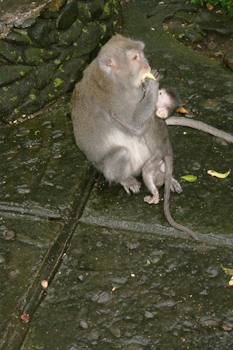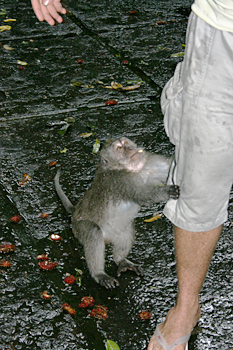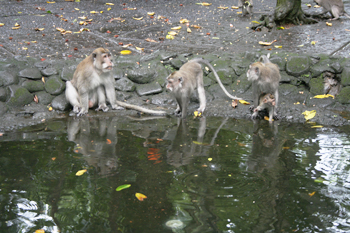When I finally rolled out of bed this morning at 8AM I threw open the drapes of the window that looks onto my balcony. Instead of the view of the river valley below I found myself gazing into two coal black eyes. A huge monkey from the Sacred Monkey Forest Sanctuary had climbed onto my balcony, perched himself on the table beneath my window, and was gazing intently through the crack in the drapes. Startled, I hopped backward. I’m pretty sure he was just as startled, because he immediately scampered up the wall and sat on the roof tiles above, screeching and clucking.

Since the Monkey Sanctuary is only about 100 feet from my hotel I decided I’d better check it out, so I spent the better part of the afternoon walking around the park watching the antics of the monkeys. Actually, the species on Bali and in the Sanctuary are Balinese macaques, also known as long-tailed macaques. Aside from humans, macaques are the most widespread and successful of all primates. About 300 macaques reside in this park. The adult males can weigh up to 22 pounds, have large canine teeth, broad shoulders and facial hair that resembles a mustache. The adult females are smaller (up to 17 pounds) and have long facial hair that looks like a beard. Their coloring ranges from silver to grey to tan, with the largest males being the most silvery. Babies hang upside down from their mothers’ bellies, looking like newborn rats with little or no fur.

This is their park and they know it. They become aggressive if they feel you are invading their territory. At one place I stopped to watch three monkeys who were playing with a garden hose that was turned on. Each of them put their hands in the water and – I swear – washed their hands. I moved in for a photo and suddenly they bared their teeth and chased me back down the sidewalk. I quickly learned that they are more apt to do this to a solo tourist, so from that point on I stayed close to other visitors. Wayan had warned me not to take food into the park if I visited the Sanctuary. While it is not prohibited to feed the monkeys (in fact, they sell bananas, coconuts and rambutan fruit for them right at the entrance), it is very much a “do so a your own risk activity.” The monkeys attack anyone who has food – like this guy who was hiding bananas under his T-shirt.
They are also quite human-like, eerily so, in fact. In addition to washing their hands, they wash their food. I watched, fascinated, as three different monkeys all rolled some sort of seed around in rain puddles, using the rough pebbles in the concrete to strip away the outer covering of the seed and then washing it thoroughly before eating it. I watched them compete over food, water, and tree perches.

At the watering hole I saw one large monkey casually stroll over to a smaller monkey, pick up its tail and sniff its butt. There are no cages or pens – these animals roam freely throughout the park – and you really have to keep your eyes peeled because you can be surrounded in an instant. It was a fascinating afternoon and a great way to spend yet another rainy day. But for sure, the phrase “monkey business” will never again have quite the same meaning for me.

OK Barb…. This entry finally compelled me to comment. You know how much I love monkeys. I have literally spent hours watching the monkeys and apes at zoos while my family is forced to just hang around and wait for me. I am certifiably jealous! Happy Birthday tomorrow. Love you,
Lin